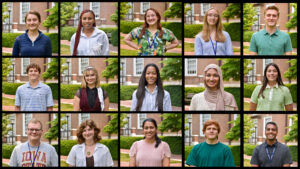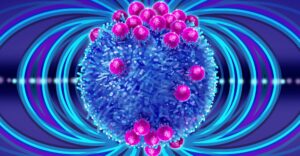
Ultra-low temperature freezers consume as much electricity annually as a typical single-family home. Hopkins laboratories can lower their lab’s carbon footprint and challenge your cold storage practices by taking part in the Freezer Challenge. Supported by the International Institute for Sustainable Laboratories (I2SL) and My Green Lab, this challenge is designed to promote best practices in cold storage management for laboratories around the world.
Johns Hopkins operates over 1,500 Ultra-low temperature freezers and even more refrigerators, standard freezers, and cold rooms that utilize millions of kWh per year. The annual challenge encourages labs to implement best practices related to cold storage maintenance, from temperature tuning (-70C is the new -80C) to removing ice buildup, that all contribute to making freezer more energy efficient.
This year, top performing labs at each Johns Hopkins school have the opportunity to earn up to $5,000 in awards used for sustainable purchases, repairs, or upgrades. All labs with cold-storage units are eligible to join the challenge.
The challenge runs through July 1, 2023 but actions as far back as August 1, 2022 are eligible be included. Many of these practices you may already be doing! As an added bonus, participation in the Freezer Challenge earns labs 2 Sustainability Actions Points towards Green Lab Certification.
To learn more about our other Green Labs initiatives at Johns Hopkins, please visit the Office of Sustainability website or email sustainability@jhu.edu. You can learn more from Freezer Challenge Asks Labs to Put Costly Energy Consumption on Ice.

Johns Hopkins Career, Academic, and Research Experiences for Students (CARES) Symposium has a mission to inspire and provide opportunities to underrepresented students in science, public health, or medicine. It provides opportunities for students who participated in summer pathway or research program to share their summer research presentations to the Hopkins community, faculty, recruits from local colleges and universities, and network with high-achieving undergraduates. This year, the 2023 CARES Symposium is a two-day event.
We welcome you to come to the event and see presentations by our Nanotechnology for Biology and Bioengineering Research Experience for Undergraduates (REU) program interns. Learn more about our REU program.
Day One
1:00 pm: Welcome
1:05 pm: Keynote Speaker
1:25pm: Keynote Q&A
1:30 pm: Stories of Triump
1:45 pm: Breakout Rooms: Research Presentations
2:45 pm: Scholarship Awards
2:55 pm: Closing

Johns Hopkins Career, Academic, and Research Experiences for Students (CARES) Symposium has a mission to inspire and provide opportunities to underrepresented students in science, public health, or medicine. It provides opportunities for students who participated in summer pathway or research program to share their summer research presentations to the Hopkins community, faculty, recruits from local colleges and universities, and network with high-achieving undergraduates. This year, the 2023 CARES Symposium is a two-day event.
We welcome you to come to the event and see presentations by our Nanotechnology for Biology and Bioengineering Research Experience for Undergraduates (REU) program interns. Learn more about our REU program.
Register for the event here.
Day Two
9:00 am: Sign-In
9:30 am: Poster Session: Group A
10:30 am: Leadership Acknowledgment
10:40 am: Panel Discussion and Q&A
11:10 am: Stories of Triumph
11:25 am: Scholarship Awards
11:45 am: Leadership Acknowledgement
11:50 am: Transition
12:10 pm: Lunch
12:45 pm: Poster Session: Group B
1:45 pm: Adjournment

Every summer the INBT welcomes undergraduate students to the Nanotechnology for Biology and Bioengineering Research Experience for Undergraduates (REU) program. Students spend 10-weeks with INBT faculty and mentors heavily engaged in research projects ranging from developing cancer therapies and diagnostic tools to using regenerative engineering to heal the body. They also participate in professional development training, networking activities, and explore Baltimore and other surrounding cities. We welcome you to join us to see presentations by our 2023 summer students as they showcase their research projects.
This event is hybrid. Space is limited in Maryland Hall 110 to 35 people. If space is unavailable please join by Zoom.
Join Zoom Meeting
https://wse.zoom.us/j/94940809585
Meeting ID: 949 4080 9585
Agenda
1:00 pm-1:05 Welcome: Sulaiman Jenkins, Director of Academic Programs – Institute for NanoBioTechnology
1:05 pm -1:12 Olivia Barbieri – Three-Dimensional Mapping of Rhesus Macaque Brainstem Tissue using CODA. Olivia interns in the Wirtz Lab. Her home institution is Barnard College.
1:12 pm -1:19 Tyler Bartolome – Heat Tolerance of 4T1 Murine Breast Cancer. Tyler interns in the Ivkov Lab. His home institution is Drake University.
1:19 pm-1:26 William Dhana – Comparison of the Normal Pancreas Microanatomy to that of Individuals at High Risk for Development of Pancreatic Cancer. William interns in the Wirtz Lab. His home institution is Florida State University.
1:26 pm -1:33 Mikhaila Doyle – Investigating the Effects of the Rate of Exposure to Drug on the Metastatic Potential of Triple Negative Breast Cancer Cells from Spheroids. Mikhaila interns in the Sofou Lab. Her home institution is Brown University.
1:33 pm-1:40 Justin Furgala – Extracellular Vesicle-Loaded Microgels as a Preventative Method for Radiation Fibrosis. Justin interns in the HQ. Mao Lab. His home institution is Clemson University.
1:40 pm -1:47 Sarah Gresham – 3D Printing at the Micro Scale: Nozzle and Material Design. Sarah interns in the Mueller Lab. Her home institution is the College of William & Mary.
1:47 pm -1:54 Annabelle Hendrickson – Investigating the immuno-stromal crosstalk in aged microenvironments of Diffuse Large B-Cell Lymphoma (DLBCL). Annabelle interns in the Phillip Lab. Her home institution is Smith College.
1:54 pm -2:01 Nicholas Herbst – Exploring the Effects of Substrate Stiffness on Metabolism. Alexandra interns in the Jeong Lab. His home institution is the University of Wisconsin – Madison.
2:01 pm: Lunch
2:45 pm – 2:52 Erin Hurley – Identification of FGL-1 interactome by APEX2 proximity labeling method. Erin interns in the X. Mao Lab. Her home institution is St. Mary’s College of Maryland.
2:52 pm -2:59 Simra Khan – Quantifying Protein Affinity: Assessing Immunofibers as an Alternative for Protein Purification. Simra interns in the Cui Lab. Her home institution is Long Island University.
2:59 pm -3:06 Demetria Labat – Synthesis and Characterization of Self-Assembling Peptide-Drug Conjugates for ChemoImmunotherapy. Demetria interns in the Cui Lab. Her home institution is Jackson State University.
3:06 pm -3:13 Kailee Parrott – Exploration into the Identification of Receptors in α-Synucleinopathy. Kailee interns in the X. Mao Lab. Her home institution is the University of Washington Seattle Campus.
3:13 pm -3:20 Roshni Patel – Investigating EGFR and EphA2 interactions in the plasma membrane at the first step of signal transduction. Roshni interns in the Hristova Lab. Her home institution is Hofstra University.
3:20 pm -3:27 Viviana Velez-Aviles – Characterizing Morphological Patterns of CD4+ Subsets. Viviana interns in the Phillip Lab. Her home institution is the University of Puerto Rico Mayaguez.
3:27 pm -3:34 Thomas-Shadi Voges – KPC Mouse Pancreatic Cancer Cells Demonstrate Thermal Sensitivity. Thomas-Shadi interns in the Ivkov Lab. His home institution is North Central College.
3:34 pm -3:40 Closing: Sulaiman Jenkins, Director of Academic Programs – Institute for NanoBioTechnology
You are invited to attend an In-vivo Cellular and Molecular Imaging Center Seminar Series presentation with Mehdi Nikkhah, Ph.D., Associate Professor of Bioengineering, Program Chair for Undergraduate Studies, School of Biological and Health Systems Engineering (SBHSE), Associate Faculty, Biodesign Virginia G. Piper Center for Personalized Diagnostics, Barrett Honors Faculty at Arizona State University, Tempe, AZ.
The title of the talk is “Tumor On-a-Chip Technologies; Building Better Organotypic Models to Study Cancer Progression”
Date: Wednesday, September 27, 2023
Time: 3:30pm – 4:30pm
Location: Stoll Conference Room, Johns Hopkins School of Medicine

The INBT is pleased to participate for the sixth year with the Johns Hopkins community in the Vernon Rice Memorial Holiday Turkey Program, which supports the Baltimore community. For every $45 raised, a basket with a fresh turkey and vegetables from a local farm will be provided to a family in need. Learn more about Vernon Rice, the program, and how to donate. You can also read this story about the program by the Johns Hopkins Hub.
Donations for the Thanksgiving holiday are due November 8, 2023. If you donate, email Gina at ginawadas@jhu.edu so she can continue tracking how many meals we supported. So far, the INBT has provided 73 meals since the team has started participating.

Join the Institute for NanoBioTechnology in celebrating National Nanotechnology Day. We’ll have nano-focused bingo, nano building blocks, molding clay, snack-sized treats, and more. Come socialize with other INBT community members.
National Nanotechnology Day is an annual event featuring community-led events and activities on or around October 9 to help raise awareness of nanotechnology, its use in products that enrich our daily lives, and the challenges and opportunities for the future. This date, 10/9, pays homage to the nanometer scale, 10 –9 meters. Learn more about the National Nanotechnology Initiative’s Nanotechnology Day.
The theme for this year’s National Nanotechnology Day is “Enabling the Nanotechnology Revolution.” This phrase is inspired by the vision statement for the NNI which is to enable “a future in which the ability to understand and control matter at the nanoscale leads to ongoing revolutions in technology and industry that benefit society.” This year we are celebrating nanotechnology’s achievements over the past 20 years, as well as looking forward to how the NNI can continue to best support critical and emerging technologies of the future.

Ultra-low temperature freezers consume as much electricity annually as a typical single-family home. Hopkins laboratories can lower their lab’s carbon footprint and challenge your cold storage practices by taking part in the Freezer Challenge. Supported by the International Institute for Sustainable Laboratories (I2SL) and My Green Lab, this challenge is designed to promote best practices in cold storage management for laboratories around the world.
Johns Hopkins operates over 1,500 Ultra-low temperature freezers and even more refrigerators, standard freezers, and cold rooms that utilize millions of kWh per year. The annual challenge encourages labs to implement best practices related to cold storage maintenance, from temperature tuning (-70C is the new -80C) to removing ice buildup, that all contribute to making freezer more energy efficient.
The challenge runs through January 1, 2024 to June 30, 2024. To learn more about our other Green Labs initiatives at Johns Hopkins, please visit the Office of Sustainability website or email sustainability@jhu.edu. You can learn more about past Freezer Challenges at Johns Hopkins.

The Advances in Immunoengineering: Fundamentals and Cutting Edge Advances workshop is hosted by Johns Hopkins Translational Immunoengineering. The workshop meets twice a week for three weeks and participants are eligible for CME credit. The workshop is also offered as a one-credit course to Johns Hopkins students
The immunoengineering field is transforming cancer, autoimmunity, regeneration, and transplantation treatments by combining the diverse and complex fields of engineering and immunology. There is a significant need to train engineers in immunology and immunologists in quantitative engineering techniques. Moreover, there is a need to bridge basic immunological discoveries with advances in clinical application. This workshop features 12 speakers that will review immune system fundamentals and components, engineering strategies to modulate the immune system, and clinical applications.
After attending this workshop, the learner will demonstrate the ability to:
– Review the fundamentals and recent discoveries in the function of the immune system.
– Identify engineering strategies to manipulate the immune system.
– Describe the clinical applications of immunoengineering.
The full schedule, speakers, topics, and registration information are available on JH-TIE’s website.
Visualizing Immunity – Insights from Multiplex Dynamic and Static Tissue-scale Imaging
Presented by: Dr. Ronald Germain
Chief, Laboratory of Immune System Biology
Chief, Lymphocyte Biology Section
Director, Center for Advanced Tissue Imaging (CAT-I)
Abstract:
Immune responses involve cell interactions within lymphoid and peripheral tissues including tumors. To gain insight into the relationships between immune function and the local tissue environment, we have developed new multiplex 2D (IBEX) and 3D (Ce3D / Ce3D-IBEX) optical imaging pipelines and associated computational methods (RAPID and SPACE) for quantitative, spatially-resolved image analysis.
IBEX is an open-source method for iterative imaging used to probe fixed frozen or FFPE mouse and human tissues to as many as 80 parameters at ~ 300 nm lateral resolution. More than 1000 antibody conjugates have been validated for IBEX and a website provides details on these reagents. Ce3D (clearing enhanced 3D) is a fast-clearing technique giving excellent signal intensity from directly conjugated antibodies, permitting a high level of multiplexing and IBEX cycling.
Using these methods we have discovered novel commensal-dependent immune clusters at the junction of vagal sensory neurons in normal lungs. In cancers, these tools have revealed how immunotherapy converts suppressive Tregs into type 1 interferon-gamma producing effectors and the unanticipated negative effects of checkpoint therapy on stem-like memory T cells. A method for identifying T cells actively signaling through the antigen receptor has enabled us to identify antigen reactive cells in fixed tissue and to identify the cognate antigen presenting cell. Ce3D has been used to quantify antigen-specific cells in entire lymph nodes, revealing that suppression of autoreactive T cells by Tregs operates by promoting abortive proliferation.
These findings illustrate the power of in situ imaging for probing the molecular, cellular, and spatial aspects of immune responses in situ.
This work was supported by the Intramural Research Program of the NIAID, NIH.
Bio:
Ronald N. Germain received his M.D. and Ph.D. from Harvard University in 1976. Since then he has investigated basic immunobiology, first on the faculty at Harvard, then at NIAID, NIH. He has contributed to understanding MHC class II molecules, antigen processing, and T cell recognition, more recently pioneering analysis of the immune system using dynamic and static in situ microscopy. He has published more than 400 scholarly research papers and reviews and trained more than 80 fellows. Among other honors, he has been elected to the National Academy of Medicine, the National Academy of Sciences, EMBO, AAAS, the American Academy of Arts and Sciences, named a Distinguished Fellow by the American Association of Immunologists., and designated a Distinguished Investigator by NIH.
In-person Class Held in Hodson 210
Zoom Link: Passcode 530803: Meeting ID: 955 8366 7779


